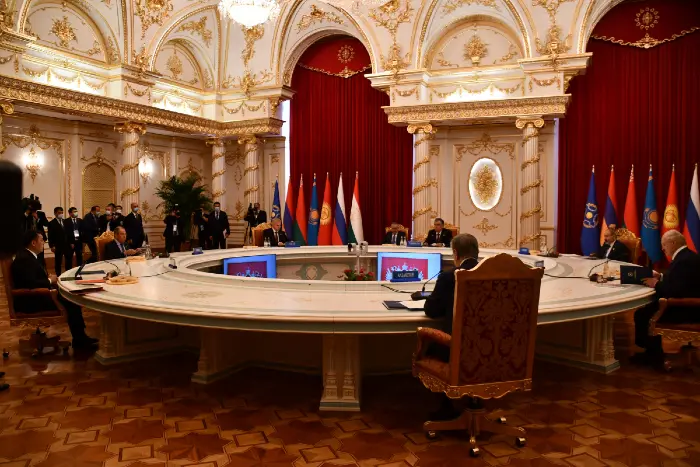Alarmed by the "unfavourable" situation along the Afghan border, Russia and the other members of the Collective Security Treaty Organisation (CSTO) have vowed to support Tajikistan with all "necessary military and military-technical assistance" in case the situation on the southern borders deteriorates.
Tajikistan is a frontline state sharing a long border with Afghanistan (1344 km) which in many sections passes through the inaccessible high-mountainous terrain. It is also deeply impacted by the Taliban's military attack on the Panjshir valley where large number of ethnic Tajiks, sharing strong emotional bonds with Tajikistan, reside.
With the security threats emanating from the territory of Afghanistan after the Taliban takeover directly affecting the situation in the Central Asian region, CSTO members Russia, Armenia, Belarus, Kazakhstan, Kyrgyzstan and Tajikistan – which chairs the organisation in 2021 – plan to use all resources available to ensure security of its member states.
A 'Declaration of the Collective Security Council of the Collective Security Treaty Organisation' was adopted in Dushanbe today after a CSTO meeting chaired by Tajikistan President Emomali Rahmon. The event was also attended by Russian President Vladimir Putin, Armenian Prime Minister Nikol Pashinyan, Belarus President Alexander Lukashenko, Kazakhstan President Kassym-Zhomart Tokayev and Kyrgyzstan President Sadyr Japarov.
The declaration expressed "serious concern" about the continuing high level of threat to the security and sovereignty of states in the CSTO area of responsibility.
It was also announced that in order to develop cooperation in countering the challenges and threats emerging from the Taliban, a series of large-scale exercises of the Collective Forces of the CSTO will be held in a month near the Tajik-Afghan border. It includes Search-2021, Echelon-2021, Interaction-2021 and Cobalt-2021, all of which will be held according to a single plan.
After reports of massive violence in Panjshir, the Central Asian countries emphasised that the activities of ISIS and other international terrorist groups are one of the key components of the instability in Afghanistan, including in its northern provinces.
Stressing that they are in favour of building up support for the Afghan settlement, the CSTO countries also said that an "enlarged troika and the Moscow format" remain the key elements to create favourable external conditions for rendering effective assistance to the national dialogue in Afghanistan.
The "extremely high level of drug production" in Afghanistan, which is one of the main sources of income for terrorist groups in the country, was also discussed during the joint meeting of the CSTO Council of Ministers of Foreign Affairs (CFM), the Council of Ministers of Defence (CMD) and the Committee of Secretaries of Security Councils (CSSC) in Dushanbe yesterday.
Warning all Afghan ethno-confessional groups to refrain from armed confrontation, the CSTO member states asked Kabul to take the necessary measures in order to normalize the situation, save the lives of civilians, restore peace, economic development, counter terrorism, extremism and drug-related crime.
"Today the situation there is unfavorable, but Tajik border guards and law enforcement agencies fully control the borders of the country," said CSTO Secretary General Stanislav Zas after Wednesday's meeting chaired by Sirodjiddin Mukhriddin, Tajikistan's Minister of Foreign Affairs.
"Therefore, all CSTO member States are united in their opinion and once again confirmed their common position: in case the situation on the southern borders of the CSTO deteriorates, the Republic of Tajikistan will be provided with all necessary military and military-technical assistance," he added.
After disturbing reports coming in from Panjshir, all six countries also spoke in favour of earliest possible formation of an inclusive government in Kabul with the participation of all social and ethnopolitical forces of the country, including representatives of national minorities.
The member states said that they remain concerned about the current situation in Afghanistan and expect that the statements made after August 15 from Kabul about the consideration and observance of the fundamental rights and freedoms of all Afghan citizens will be translated into subsequent practical actions.
They were especially worried about women, representatives of the media and civil society and the fate of former government officials, military personnel and all those who collaborated with foreign military presence.
The CSTO member states also opposed the deployment on their territory of the military infrastructure of the United States and other NATO countries located in Afghanistan, as well as Afghan citizens who collaborated with foreign military presences, except in cases requiring an urgent solution for humanitarian purposes.
Also Read: Afghanistan's absence in Dushanbe SCO meeting will stand out




















